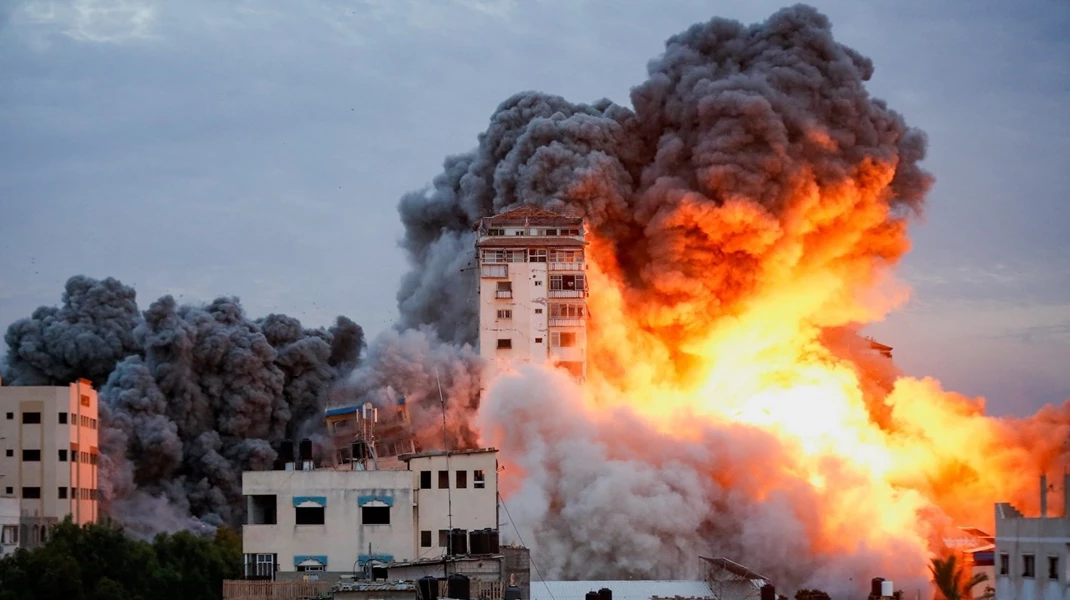How Orwellian Newspeak and Doublethink are used to justify murder in Gaza

In all the weeks of Israel’s bombing and besiegement of Gaza, the leaders of America and Britain have continued to set new standards in distortion and deception. Cliche though it may be, one cannot help but be reminded of George Orwell’s warnings about how language could be used to degrade people’s faculties of communication, clarity, and compassion.
“Political speech and writing are largely the defence of the indefensible,” Orwell declared in a 1946 essay, Politics and the English language. In it, Orwell wrote: “Things like the continuance of British rule in India [which had ended the previous year], the Russian purges and deportations, the dropping of the atom bombs on Japan, can indeed be defended, but only by arguments which are too brutal for most people to face, and which do not square with the professed aims of the political parties. Thus political language has to consist largely of euphemism, question-begging, and sheer cloudy vagueness.”
Fast forward to 2023 and Orwell could have written almost exactly the same essay, albeit with different examples, about the political defence of the unceasing horrors that have been visited on the innocent people of Gaza in recent weeks, in full view of a watching world.
Orwell’s masterpiece, 1984, penned two years after Politics and the English Language, examined the role of truth and manipulation in a then future authoritarian society, where those in power employed concepts such as newspeak and doublethink. The former seeks to invert reality by turning words on their head, as in the Ministry of Truth, which promotes lies and the Ministry of Peace, which makes war. The latter tool of manipulation subverts truth by the simultaneous acceptance of two contradictory ideas, such as the command that citizens must believe that two and two make five if the party commands it, but remember that they make four when designing an engine.
The distortion of language is no less egregious today than it was in 1946 or 1948.
In the sixth week of Israel’s war on Gaza, Western leaders employed one of Orwell’s linguistic bugbears – “euphemism” and “sheer cloudy vagueness” – to refer to Israeli action, as IDF troops stormed Al-Shifa in search of evidence that Hamas uses the hospital as a command centre. After Doctors Without Borders said that Israeli troops had fired on medical teams as well as on an ambulance attempting to retrieve injured people from the hospital gates, Biden called for “less intrusive action” and Britain’s prime minister Rishi Sunak said Israel “must act within international law…too many civilians are losing their lives.”
What Biden really meant was that it was wrong for Israel, the military occupier, to target Gaza’s largest medical facility, Al-Shifa, killing scores of patients and medical staff and endangering the lives of countless others.
It was left to the heads of various United Nations’ agencies to describe Israel’s actions in clear terms. Martin Griffiths, chief of the UN’s humanitarian and emergency relief office, said on social media that “the protection of newborns, patients, medical staff and all civilians must override all other concerns. Hospitals are not battlegrounds.” UN secretary general António Guterres said that Gaza was becoming a “graveyard for children.”
What Rishi SUnak really meant was that the soaring civilian casualties had surpassed 11,000 by November 8. He meant that hideous reports were coming in of dogs eating the bodies of dead babies in Al Shifa’s crowded hospital compound because there is nowhere and no one to bury them. That Gazan doctors had testified that they had conducted emergency operations in primitive conditions, such as bare floors, without anaesthetic or analgesic. And that Israel had already violated international humanitarian law, principally the Geneva Conventions, ratified by 196 countries.
But Sunak did not say that. Instead it has been left to those such as Dr Rick Brennan, the regional emergency director for the World Health Organization’s Eastern Mediterranean Region, to spell out the facts. On November 13, Brennan said that two-thirds of Gaza’s dead are women and children when “normally, we would expect around, you know, 60 to 70 percent at least to be amongst adult men.” He called this figure “an extraordinary statistic,” and went on to list some of the atrocities: “a hundred humanitarian workers killed, [the] highest number ever…over 30 reporters killed, [the] highest number in a conflict ever documented.”
In western capitals, even in the sixth week of the brutal attack on Gaza, the argument has raged over semantics. Would the suspension of hostilities by Israel be called a ceasefire, a humanitarian pause, or a craven surrender to brutal terrorists? As people in Gaza have suffered and died, the futility of debating such abstruse points has become more and more repugnant.
The tragedy of Gaza has highlighted that the tools of manipulation of which Orwell warned us are still very much with us, employed just as much by modern political figures and media as by their predecessors.

